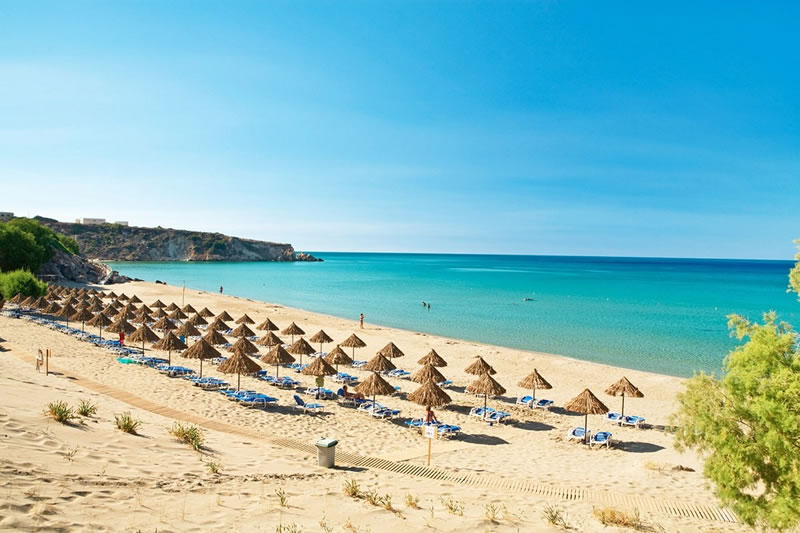A new bill is being introduced in Parliament to facilitate this year's leases.
This bill includes new rules regarding the minimum distance between concessions, the maximum area of the beach that can be granted for exploitation, and the safeguarding of fraudulent beaches where necessary.
1. concession areas are being subjected to limits to ensure access for all citizens and free space for non-concession users.
In particular, in every case it is required that at least 50% of the beach area should be free. To be specific, the total area or length of the coastal and beach sections granted should not exceed 50% of the front."
Each concession area should not be more than 500 square meters. If it is about protected beaches and beaches located in Natura areas that have not been classified as fraudulent, then the umbrella seats can occupy up to 30% of the allocated area; otherwise, they can occupy up to 60% of the allocated area. The distance between two concessions should be at least 6 meters (3 meters on each side), and the distance between the sea and the umbrella seats should be at least 4 meters.
It is not allowed to have seafront and beach concessions if they are less than 4 meters in length or width, or if the total area of the distinct part of the seafront is less than 150 square meters.
It is important to note that the old seafront that borders unspoilt beaches is shared, while the remaining parts of the old seafront belong to the State's private property and can be used by HPPC. It is also clarified that the redefinition of an old beach does not affect any rights that have been acquired or recognized by a notarial or other public document.
2. Concession tenders will now be centrally executed by the State Real Estate Service through an electronic process.
From now on, the Hellenic Public Real Estate Agency will be in charge of holding auctions until March 31 of each year, instead of the Municipalities. These auctions will take place on an electronic platform to ensure that the process is simplified, standardized, transparent, and efficient.
The platform will provide the necessary data for each concession, such as coordinates, polygon, and aerial photos. Additionally, the duration, terms, and specific information regarding mobile elements (such as the time of placement and removal) will be posted 20 days before the auction. The minimum price for each concession will be based on a mathematical formula that takes into account the objective values of the area, the weighting factor of the activity, and the weighting factor of the beach (depending on its special characteristics).
Once the bidding process is over, the electronic platform will automatically generate a draft contract, which will be sent to the bidder via email. It's important to note that the Municipalities will still collect 60% of the consideration for the concession.
3.Obligations of concessionaires
Apart from the restrictions that apply to the area of exploitation, the distances from the sea and any other concessions, the concession holders have the following minimum obligations:
a) ensure the free, unimpeded and safe passage of the public on the seashore and the beach.
b) ensure the use of the seafront and the beach for people with disabilities, by installing special platforms to serve people with disabilities (sea tracks), if these have not been installed by the municipality. In this case, the concessionaire offsets the costs of installing the platforms in exchange for the concession,
c) keep the allocated part of the coastline and beach clean every day,
d) post a sign with the coordinates of the concession, the concession decision number, the rights of the public, as well as a unique QR code for each concession, in a visible place on the seafront or the beach,
e) install showers and changing rooms for the public's service,
f) take care of maintaining the balance of the ecosystem of the granted area, such as by maintaining the morphology of the coast and the coastline,
g) deliver the space in its original state at the end of the concession,
h) ensure the presence of a lifeguard, as long as this obligation is not covered by the relevant municipality. In this case, the lifeguard's fee is offset against the concession.
With the declaration, additional obligations of the concession holder can be foreseen in relation to the protection, preservation and development of the concessioned part of the coast and beach and the strengthening of the common use.
4. Controls and complaints using modern technology
Citizens can now easily file complaints through a mobile app.
5. Strict penalties for offenders
The penalties include fines, removing illegal installations, sealing the business, and banning from new tenders.















